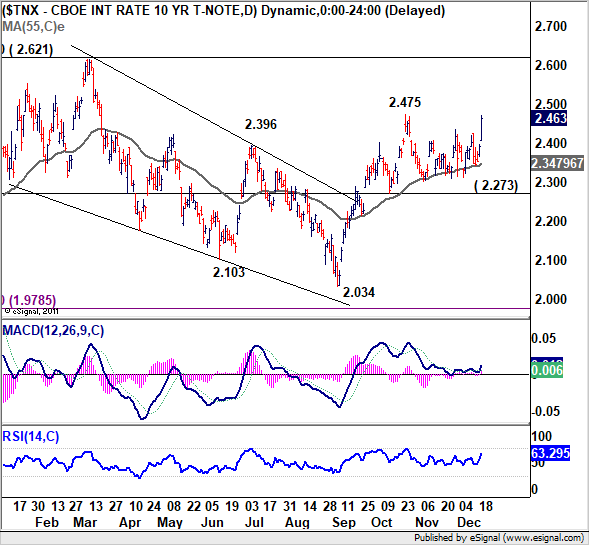Euro is trading as the strongest currency this week as boosted by a surge in German yields. Meanwhile, Dollar is holding a soft tone after House passed the tax bill and then came back with a hiccup. Nonetheless, the Chambers will probably pass the unified version on Wednesday, giving it enough time for President Donald Trump to sign it before Christmas. Elsewhere in the currency markets, Kiwi tumbles broadly today after much worse than expected trade deficit. Yen followed closely as pressured by surging global yields.
House to vote on tax bill again (after passing) Wednesday
The House passed Republican's tax bill yesterday with 227-203 votes. However, as the Senate's parliamentarian said that the so called Byrd Rule was violated by three provisions of the bill, House will have to vote again on a Senate amended plan. Senate is planned to vote on it Tuesday evening in the US, within hours from the time of writing.
10 year yield surged with 2.475 in sight
While Dollar has shown no positive reactions to news on the tax bill, 10 year yield took a strong rally overnight. While the surge in TNX could be seen as attributed to jump in German yield too, the impact of tax cut should be clear. Closing at 2.463, TNX will now have 2.475 near term resistance in sight. Break there will extend the rebound from 2.034 to key resistance level at 2.621. That would likely take USD/JPY back to 113.74 and 114.73 respectively.

Dallas Fed Kaplan not too worried about recession
Dallas Fed President Robert Kaplan said he is expecting three more rate hikes in 2018. He sounded not too concerned with flattening yield curve. He said that "the history of inversions is such that it has tended to be a pretty reliable forward indicator of recession. Now, this time may be different, but I wouldn't count on it." Nonetheless, he pointed out that "it limits the Fed's operating flexibility, in my judgment, in terms of how fast and how much we can raise rates."
Germany to sell more 30 year bunds in 2018, yields surged
Germany said yesterday that it's going to sell EUR 16b of 30 year bunds in 2018, up from around EUR 11b this year. More importantly, it's the only part in the spectrum that supply is expected be increased. 30 year bund yield rose 8 points to 1.19 and 10 year bund yield jumped 7 pt to 0.37. That's seen as a major factor in pushing Euro higher. It's also another factor that pressed down Yen and lifted US yields. Euro is so far trading as the strongest one in dull markets this week. But we'll stay skeptical on its strength. EUR/CHF and EUR/JPY are not out of the woods yet and are stuck in recent ranges.
Kiwi tumbles on wide trade deficit
New Zealand Dollar dips notably after data showed larger than expected trade gap in November. Trade deficit widened to NZD -1193m, from NZD -843m. That's also more than double of expectation of NZD -550m. It's the first monthly deficit at more than NZD -1b for November since 2005. Exports jumped 20% yoy to NZD 4.6b with milk, powder, butter and cheese leading the gain. Exports to China, its largest market also jumped 43%. On the other hand, imports jumped 27% to record of NZD 5.8b. Stats NZ noted that the huge deficit was affected by large value imports like aircraft. But taking that away, deficit was still at NZD -930m.
Also from New Zealand, current account deficit narrowed to NZD -4.68b in Q3. From Australia, Westpac leading index rose 0.1% mom in November.
Looking ahead
Germany will release PPI in European session while Eurozone will release current account. UK will release CBI reported sales. US will release existing home sales later in the day.
